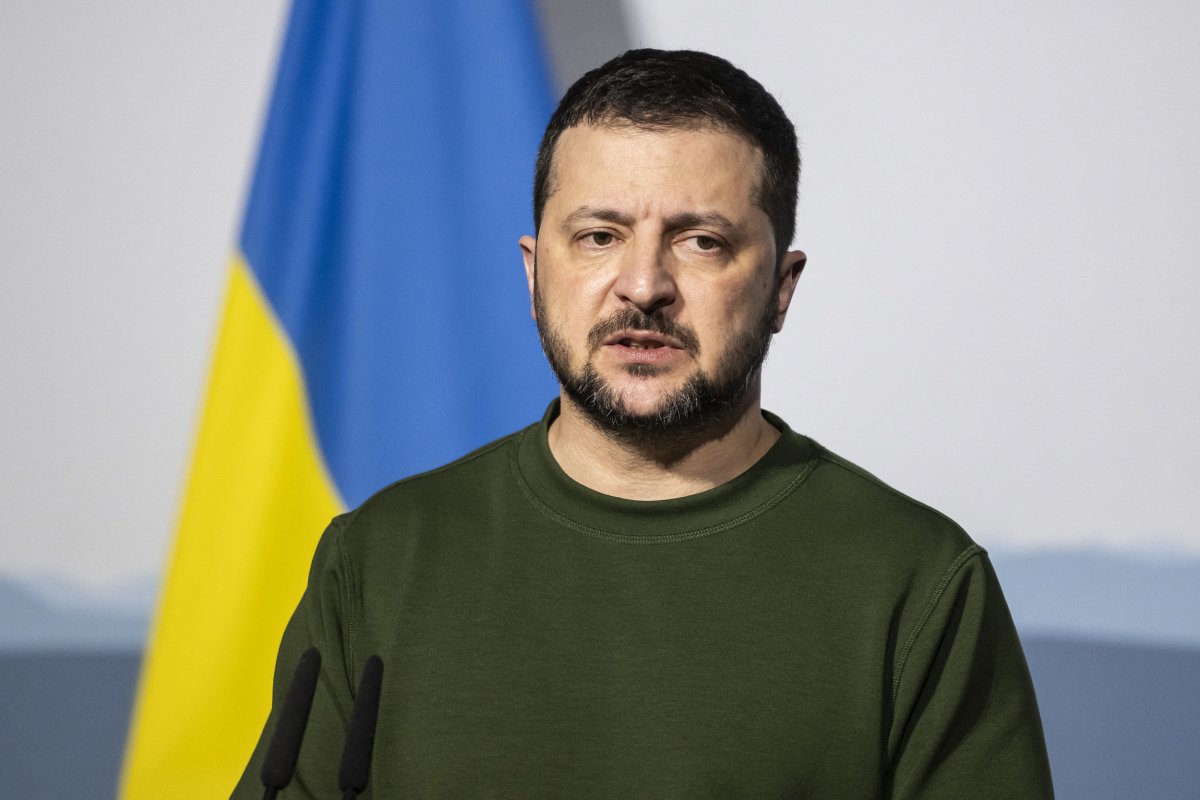With the war started by Russia entering its third year, Ukrainian President Volodymyr Zelensky is also fighting on another front—corruption.
On January 9, Zelensky’s defense minister, Rustem Umerov, said an audit had uncovered corruption connected to military procurement worth 10 billion hryvnia ($262 million) in only the four months he had been in post. His predecessor, Oleksii Reznikov, resigned in September over scandals that threatened to sap domestic and international confidence in Kyiv.
These cases included the dismissal of two senior officials over allegations the ministry had inflated contracts for food supplied to troops, including eggs. In December, a defense ministry official was arrested on suspicions that he embezzled nearly $40 million in the fraudulent purchase of much-needed artillery shells for Ukraine’s military.
Getty Images
There was also outrage in August over inflated prices for an order of 233,000 jackets for $20m from Turkish firm Vector Avia that were too light and thus useless for the impending winter.
Reznikov was not personally implicated in the scandals, but his resignation letter admitted the bad optics, amid a deadlock over continued financial aid in the U.S. and the EU whose leaders do not want to see money to fight Russia being siphoned off.
It marks a shift in the kind of corruption Zelensky has to tackle, which before the war involved influence peddling to avoid investigation or to get favorable terms. “In the past, it was unclear how this corruption affected people’s lives in Ukraine—now it’s very clear that corruption inhibits Ukrainians’ ability to defend themselves,” said Matthew Orr, a Eurasia analyst at risk intelligence company RANE.
“Because the country’s economy has changed, now the corruption is inherently linked to the war effort. There’s almost benefits in that to Ukrainians because it raises the anger and intolerance of corruption to an even higher level,” Orr told Newsweek.
His report for RANE this month said Kyiv had made progress in corruption prevention reforms with the judicial and political system, which would continue over the next 18 months. It also predicted Ukraine’s allies may link future military aid to reforms that will also boost the economy, making Ukraine less reliant on Western support.
The U.S. has given Ukraine $75 billion to fight Russia, but that assistance dried up after Congress could not pass President Joe Biden’s emergency funding request. Some Republicans demanded the $61 billion military aid Biden wanted for Kyiv be paired with changes to increase security on the U.S.-Mexico border.

ALESSANDRO DELLA VALLE/Getty Images
Mansions and shopping trips
Zelensky’s visit to Congress in December came at a time of other congressional priorities and adding fuel to the GOP wing opposing further help Kyiv were outlandish claims of the Ukrainian president’s plans to live the high life after the war.
Lauren Witzke, a far-right activist and 2020 Republican Senate nominee for Delaware, recirculated a claim that Zelensky had bought a $20 million mansion in Vero Beach, Miami as she called for the U.S. to “CUT OFF UKRAINE” from funding.
While a fact check showed that Zelensky does not appear in any public records of property owners in that county, the post which included photos of a property, racked up millions of views and was recirculated by other conservative accounts.
Claims of graft Zelensky faces “play into deeper Republican criticisms of corruption and the waste of U.S. aid in many other countries around the world,” Anatol Lieven, Eurasia Program director at the Quincy Institute for Responsible Statecraft, in Washington, DC.
These are “being instrumentalized to reduce U.S. aid where in fact it would have been honestly used and very useful,” he told Newsweek. “Zelensky has been told repeatedly in public and in private that he simply must do something very visible to crack down on corruption to help the Biden administration get its aid package through Congress.”
Zelensky has faced other unfounded claims of having an international property portfolio. In July, the X account of Liz Churchill posted to 273,000 followers an image of a luxury house with an infinity pool described as “Zelensky’s home.” Social media users ridiculed the claims over the $5.5 million house, which were debunked in a Newsweek Fact Check, as were allegations Zelensky had bought a $48 million yacht with U.S. funds.
Zelensky’s wife, Olena Zelenska, has also been the subject of the rumor mill and was falsely accused of using a diplomatic trip to France to go on a $40,000 shopping spree in Paris in December 2022. In October 2023 a claim went viral that she had spent $1.1 million at the Cartier store in New York, while on diplomatic business.
Zelenska was even accused without evidence of buying a private island of Pumpkin Key, Florida worth $95 million, despite the property remaining on the market at the time the claims were made in a Russian TikTok video.
Even if unfounded, could allegations of graft that Zelensky’s presidential character on the TV show Servant of the People mocked hurt him domestically while in office for real?
“I don’t think that those stories are particularly effective,” said Orr. “The Russian language crowd, or the people who would really be convinced of those stories—the pre-war, vaguely pro-Russian electorate, has declined.”
“Even if some people are swayed, I don’t think it has a broader resonance amongst the rest of the Ukrainian public,” he said. “It almost sounds like Russians involved in those cases are trying to look at what’s had resonance in Russia and then assumed that would be the way you slander the Ukrainians.”

ROMAN PILIPEY/Getty Images
Ihor Kolomoisky and mobilization
Ukraine’s anti-corruption drive included the arrest in September 2023 of billionaire Ihor Kolomoisky, who was considered by Zelensky’s opponents to be his key backer for the presidential election campaign of 2019.
Kolomoisky was alleged to have transferred $14m abroad over seven years using banks he controlled. His home in the southeastern city of Dnipro was raided in February 2023 in a separate investigation into embezzlement and tax evasion.
“There is always a risk that if Zelensky goes really hard after corruption, a lot of these local bosses, like Kolomoisky, may throw their weight behind the former President Petro Poroshenko,” said Lieven. “Zelensky has done more than any previous Ukrainian president,” to tackle corruption, “but he is in a very difficult situation and he has to balance between different threats.”
“One can imagine a situation in which endangered Ukrainian oligarchs think, ‘Zelensky is becoming too much of a threat to us. We’d better back his political opponents who will be grateful to us when they come to power.'”
The Delegation of the European Union to Ukraine said in November Kyiv had “stepped up reforms” in investigating and prosecuting high-level corruption cases. The Specialized Anti-Corruption Prosecutor’s Office (SAPO) and the National Anti-Corruption Bureau of Ukraine (NABU) appointed new heads in July 2022 and March 2023.
Meanwhile, Ukraine’s parliamentary anti-corruption policy committee has identified problems in a new bill on conscription that could give rise to corruption risks after Zelensky announced on December 19 the likely mobilization of 500,000 recruits.
Zelensky will be keen to avoid a repeat of officials being accused of taking bribes from those seeking to avoid the frontlines, which prompted him to dismiss the heads of Ukraine’s regional military recruitment centers in August.
“The administration had to do it because they have to show that the buck stops with them,” said Orr. “The people that replaced them were very motivated soldiers who have been fighting in the war of various ranks but there was the question about whether these jobs were actually suited for them and whether they’ll be more effective elsewhere.”
Newsweek has contacted Ukraine’s parliamentary anti-corruption policy committee and the Ukrainian presidential office for comment.
Uncommon Knowledge
Newsweek is committed to challenging conventional wisdom and finding connections in the search for common ground.
Newsweek is committed to challenging conventional wisdom and finding connections in the search for common ground.


